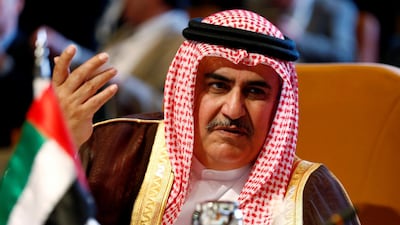Bahrain on Tuesday defended its decision to host a US conference to address the Palestine-Israel crisis, saying it wanted to support the “brotherly Palestinian people".
The Palestinian Authority has rejected the economic conference planned for next month, which is part of the White House’s long-awaited peace plan.
The authority said any peace effort that ignored the Palestinian people's aspirations for an independent state was doomed to fail and a senior official likened the plan to financial blackmail.
Bahrain’s Foreign Minister, Sheikh Khalid bin Ahmed Al Khalifa, tweeted that his country respected the Palestinian leadership’s steadfast position in protecting its people's rights.
Sheikh Khalid said Bahrain “has been and continues to be championing the brotherly Palestinian people in the restoration of their legitimate rights in their land and an independent state with its capital as East Jerusalem, additionally economically supporting the Palestinian people".
He said there was no other reason for hosting the conference than Bahrain’s continued support of the Palestinians.
Gulf countries remain opposed to the Israeli occupation and Palestinian demands for independence while Al Aqsa Mosque compound in East Jerusalem holds religious significance to Muslims around the world.
In recent weeks, civil groups in Bahrain took to Twitter to protest against a visit to Manama by an Israeli delegation to a global entrepreneurship summit. Bahrain’s lower house of parliament issued a statement rejecting the visit.
Meanwhile, the Trump administration is trying to convince Arab states to contribute to economic incentives that could persuade Palestinians to accept its Middle East plan.
The plan, two years in the making, envisions large-scale investment and infrastructure work in the Palestinian territories.
But the central political elements remain mostly unknown. President Donald Trump’s senior adviser and son-in-law, Jared Kushner, and special envoy Jason Greenblatt have been leading on the plan, but the Palestinians are refusing to speak to the US.
The conference, on June 25 and 26 in Manama, will not address the most contentious parts of the conflict: borders, the status of Jerusalem, Palestinian refugees and Israel’s security.

